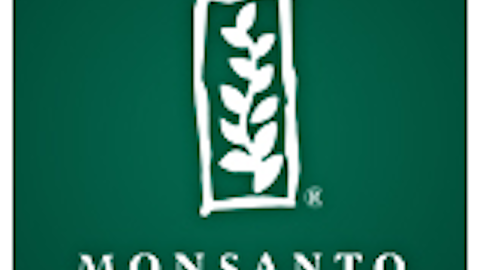In this most recent court ruling, the U.S. Supreme Court ruled that Monsanto Company (NYSE:MON)’s patents enable it to prevent farmers from planting later generations of its seeds without first paying for those seeds. This is real break from the historical norm where in crops that were planted left the farmer with the ability to replicate them by saving and replanting the seeds the crops produced. Now, if those crops originated from Monsanto Company (NYSE:MON) seeds this is no longer the case as farmers must pay Monsanto for those seeds.

Source: Monsanto
While this ruling is minor in terms of the $84,000 judgment Monsanto will receive from the farmer, what it does is protect the company’s cash flows from its growing portfolio of genetically engineered seeds. That patent protection is important – earlier this year, the company struck a deal with DuPont Fabros Technology, Inc. (NYSE:DFT) in which the chemical manufacturer will pay it $1.75 billion in a licensing deal. In addition, the two companies would drop the standing law suits held against each other. Instead of competing they will be collaborating, with DuPont Fabros Technology, Inc. (NYSE:DFT) gaining access to key patents in the Monsanto Company (NYSE:MON) portfolio.
It’s in that deal with DuPont Fabros Technology, Inc. (NYSE:DFT) as well as in its recurring seeds business that is the real driver behind these lawsuits. According to the Center for Food Safety, Monsanto has brought over 140 patent infringement suits against over 400 farmers and more than 50 small businesses. Total winnings? About $23 million which is a drop in the bucket for the company.
What it’s after is protecting its intellectual property, which drives profits. These court rulings help it maintain control over the commercial seed world which, when combined with DuPont Fabros Technology, Inc. (NYSE:DFT) and Syngenta AG (ADR) (NYSE:SYT), is 53% according to the CFS. Further, when you consider that around 93% of soybeans and north of 85% of corn in the United States comes from genetically modified seeds, you can understand just how vast the market is for its products. For Monsanto it represents about $2 billion in free cash flow each year.
I can understand that many investors want nothing to do with Monsanto Company (NYSE:MON). It’s most recent court battle was against an elderly farmer who did what farmers traditionally did, used seeds from last year’s harvest to plant this year’s crops.
To some, lawsuits such as this one against poor farmers are morally reprehensible and to others the fact that the company is messing with the genetics of the food supply is cause for grave concern.
The reason Monsanto Company (NYSE:MON) and its peers even exist is to help farmers produce more crops from less land in order to feed the world’s growing population. There are other ways to invest in a solution to these agricultural issues; some investors might find a more palpable investment opportunity with fertilizer makers Agrium Inc. (USA) (NYSE:AGU) or Potash Corp./Saskatchewan (USA) (NYSE:POT).
Agrium Inc. (USA) (NYSE:AGU) is the largest global agriculture retailer while also being the world’s third-largest nitrogen producer. It’s also a leading fertilizer distributor and a world leader in controlled-release fertilizers. Finally, the company also is a low-cost potash producer.
While Agrium Inc. (USA) (NYSE:AGU) offers diversity, Potash Corp./Saskatchewan (USA) (NYSE:POT) offers focus. The company’s Canadian operations represent 20% of global capacity and the company has more potash than any other company in the world. That’s important because potash is a key nutrient in helping farmers produce more food on less land. Both companies are helping farmers do more with less, which like it or not is a driver behind Monsanto’s business as well.
No matter your view of the company, Monsanto continues its winning ways in court. With that, the company and its peers have locked up a large part of the commercial seed market. That’s proved to be a winning combination which has sent the company’s shares up over 1,000% in the past decade.
The article The U.S. Government’s Favorite Agriculture Company originally appeared on Fool.com is written by Matt DiLallo.
Matt DiLallo has the following options: Long Jan 2015 $70 Calls on Monsanto, Short Jan 2015 $70 Puts on Monsanto, and Short Jul 2013 $95 Calls on Monsanto. The Motley Fool has no position in any of the stocks mentioned.
Copyright © 1995 – 2013 The Motley Fool, LLC. All rights reserved. The Motley Fool has a disclosure policy.

